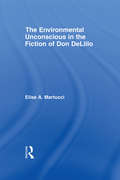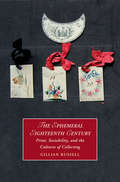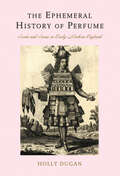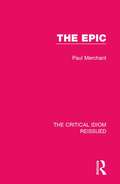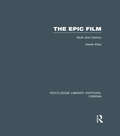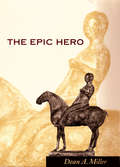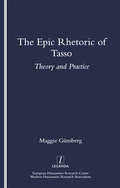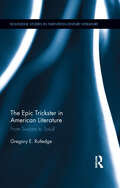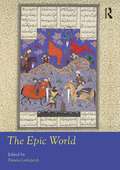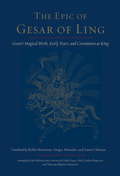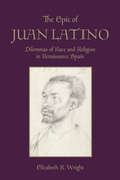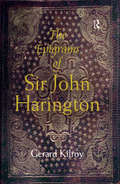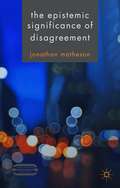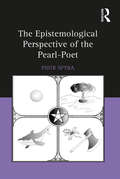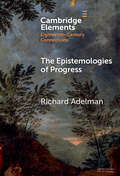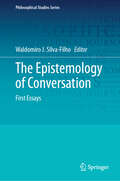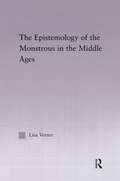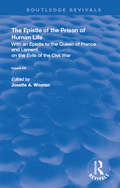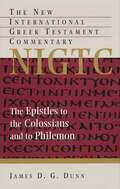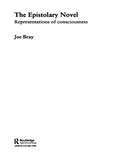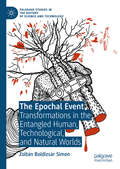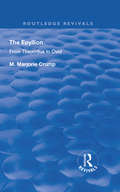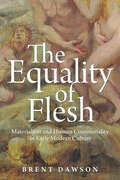- Table View
- List View
The Environmental Unconscious in the Fiction of Don DeLillo (Studies in Major Literary Authors)
by Elise MartucciThis book presents an ecocritical reading of DeLillo’s novels in an attempt to mediate between the seemingly incompatible influences of postmodernism and environmentalism. Martucci argues that although DeLillo is responding to and engaging with a postmodern culture of simulacra and simulation, his novels do not reflect a postmodernist theory of the "end of nature." Rather, his fiction emphasizes the lasting significance of the natural world and alerts us to the dangers of destroying it. In order to support this argument, Martucci examines DeLillo’s novels in the context of traditional American literary representations of the environment, especially through the lens of Leo Marx’s discussion of the conflict between technology and nature found in traditional American literature. She demonstrate that DeLillo’s fiction explores the way in which new technologies alter perceptions and mediate reality to a further extent than earlier technologies; however, she argues that he keeps the material world at the forefront of his novels, thereby illuminating the environmental implications of these technologies. Through close readings of Americana, The Names, White Noise, and Underworld, and discussions of postmodernist and ecocritical theories, this project engages with current criticism of DeLillo, postmodernist fiction, and environmental criticism.
The Environmental Unconscious: Ecological Poetics from Spenser to Milton
by Steven SwarbrickBringing psychoanalysis to bear on the diagnosis of ecological crisis Why has psychoanalysis long been kept at the margins of environmental criticism despite the many theories of eco-Marxism, queer ecology, and eco-deconstruction available today? What is unique, possibly even traumatic, about eco-psychoanalysis? The Environmental Unconscious addresses these questions as it provides an innovative and theoretical account of environmental loss focused on the counterintuitive forms of enjoyment that early modern poetry and psychoanalysis jointly theorize.Steven Swarbrick urges literary critics and environmental scholars fluent in the new materialism to rethink notions of entanglement, animacy, and consciousness raising. He introduces concepts from psychoanalysis as keys to understanding the force of early modern ecopoetics. Through close readings of Edmund Spenser, Walter Ralegh, Andrew Marvell, and John Milton, he reveals a world of matter that is not merely hyperconnected, as in the new materialism, but porous and off-kilter. And yet the loss these poets reveal is central to the enjoyment their works offer—and that nature offers.As insightful as it is engaging, The Environmental Unconscious offers a provocative challenge to ecocriticism that, under the current regime of fossil capitalism in which everything solid interconnects, a new theory of disconnection is desperately needed. Tracing the propulsive force of the environmental unconscious from the early modern period to Freudian and post-Freudian theories of desire, Swarbrick not only puts nature on the couch in this book but also renews the psychoanalytic toolkit in light of environmental collapse.
The Ephemeral Eighteenth-Century: Print, Sociability and the Cultures of Collecting (Cambridge Studies in Romanticism #129)
by Gillian RussellOften regarded as trivial and disposable, printed ephemera, such as tickets, playbills and handbills, was essential in the development of eighteenth-century culture. In this original study, richly illustrated with examples from across the period, Gillian Russell examines the emergence of the cultural category of printed ephemera, its relationship with forms of sociability, the history of the book, and ideas of what constituted the boundaries of literature and literary value. Russell explores the role of contemporary collectors such as Sarah Sophia Banks in preserving such material, arguing for 'ephemerology' as a distinctive strand of popular antiquarianism. Multi-disciplinary in scope, The Ephemeral Eighteenth Century reveals new perspectives on the history of theatre, the fiction of Maria Edgeworth and Jane Austen, and on the history of bibliography, as well as highlighting the continuing relevance of the concept of ephemerality to how we connect through social media today.
The Ephemeral History of Perfume: Scent and Sense in Early Modern England
by Holly DuganIn contrast to the other senses, smell has long been thought of as too elusive, too fleeting for traditional historical study. Holly Dugan disagrees, arguing that there are rich accounts documenting how men and women produced, consumed, and represented perfumes and their ephemeral effects. She delves deeply into the cultural archive of olfaction to explore what a sense of smell reveals about everyday life in early modern England. In this book, Dugan focuses on six important scents—incense, rose, sassafras, rosemary, ambergris, and jasmine. She links these smells to the unique spaces they inhabited—churches, courts, contact zones, plague-ridden households, luxury markets, and pleasure gardens—and the objects used to dispense them. This original approach provides a rare opportunity to study how early modern men and women negotiated the environment in their everyday lives and the importance of smell to their daily actions. Dugan defines perfume broadly to include spices, flowers, herbs, animal parts, trees, resins, and other ingredients used to produce artificial scents, smokes, fumes, airs, balms, powders, and liquids. In researching these Renaissance aromas, Dugan uncovers the extraordinary ways, now largely lost, that people at the time spoke and wrote about smell: objects "ambered, civited, expired, fetored, halited, resented, and smeeked" or were described as "breathful, embathed, endulced, gracious, halited, incensial, odorant, pulvil, redolent, and suffite." A unique contribution to early modern studies, The Ephemeral History of Perfume is an unparalleled study of olfaction in the Renaissance, a period in which new scents and important cultural theories about smell were developed. Dugan’s inspired analysis of a wide range of underexplored sources makes available to scholars a remarkable wealth of information on the topic.
The Epic (The Critical Idiom Reissued #16)
by Paul MerchantFirst published in 1971, this work examines the tradition of the epic and the many forms in which it has presented itself over time. After unpicking the defining aspects of an epic, the book tracks the literary tradition from the classical period through to modern day. Exploring major texts such as Beowulf, Odyssey, Divina Comedia, The Faerie Queene and Ulysses, this work will be a valuable resource for those studying the epic and English literature.
The Epic Film: Myth and History (Routledge Library Editions: Cinema)
by Derek ElleyAs Charlton Heston put it: ‘There’s a temptingly simple definition of the epic film: it’s the easiest kind of picture to make badly.’ This book goes beyond that definition to show how the film epic has taken up one of the most ancient art-forms and propelled it into the modern world, covered in twentieth-century ambitions, anxieties, hopes and fantasies. This survey of historical epic films dealing with periods up to the end of the Dark Ages looks at epic form and discusses the films by historical period, showing how the cinema reworks history for the changing needs of its audience, much as the ancient mythographers did. The form’s main aim has always been to entertain, and Derek Elley reminds us of the glee with which many epic films have worn their label, and of the sheer fun of the genre. He shows the many levels on which these films can work, from the most popular to the specialist, each providing a considerable source of enjoyment. For instance, spectacle, the genre’s most characteristic trademark, is merely the cinema’s own transformation of the literary epic’s taste for the grandiose. Dramatically it can serve many purposes: as a resolution of personal tensions (the chariot race in Ben-Hur), of monotheism vs idolatry (Solomon and Sheba), or of the triumph of a religious code (The Ten Commandments). Although to many people Epic equals Hollywood, throughout the book Elley stresses debt to the Italian epics, which often explored areas of history with which Hollywood could never have found sympathy. Originally published 1984.
The Epic Gaze: Vision, Gender and Narrative in Ancient Epic
by Helen LovattThe epic genre has at its heart a fascination with the horror of viewing death. Epic heroes have active visual power, yet become objects, turned into monuments, watched by two main audiences: the gods above and the women on the sidelines. This stimulating, ambitious study investigates the theme of vision in Greek and Latin epic from Homer to Nonnus, bringing the edges of epic into dialogue with celebrated moments (the visual confrontation of Hector and Achilles, the failure of Turnus' gaze), revealing epic as massive assertion of authority and fractured representation. Helen Lovatt demonstrates the complexity of epic constructions of gender: from Apollonius' Medea toppling Talos with her eyes to Parthenopaeus as object of desire. She discusses mortals appropriating the divine gaze, prophets as both penetrative viewers and rape victims, explores the divine authority of epic ecphrasis, and exposes the way that heroic bodies are fragmented and fetishized.
The Epic Hero
by Dean A. MillerSelected by Choice Magazine as an Outstanding Academic TitleFrom Odysseus to Aeneas, from Beowulf to King Arthur, from the Mahâbhârata to the Ossetian "Nart" tales, epic heroes and their stories have symbolized the power of the human imagination. Drawing on diverse disciplines including classics, anthropology, psychology, and literary studies, this product of twenty years' scholarship provides a detailed typology of the hero in Western myth: birth, parentage, familial ties, sexuality, character, deeds, death, and afterlife. Dean A. Miller examines the place of the hero in the physical world (wilderness, castle, prison cell) and in society (among monarchs, fools, shamans, rivals, and gods). He looks at the hero in battle and quest; at his political status; and at his relationship to established religion. The book spans Western epic traditions, including Greek, Roman, Nordic, and Celtic, as well as the Indian and Persian legacies. A large section of the book also examines the figures who modify or accompany the hero: partners, helpers (animals and sometimes monsters), foes, foils, and even antitypes. The Epic Hero provides a comprehensive and provocative guide to epic heroes, and to the richly imaginative tales they inhabit.
The Epic Rhetoric of Tasso: Theory and Practice
by Maggie Gunsberg"Maggie Gunsberg examines the ""poetica"" and ""poesia"" of Tasso in the context of the historical and cultural climate in which he lived. His epic theory is explored from the point of view of three rhetorical faculties current in 16th-century poetics: ""inventio"", ""dispositio"" and ""elocutio"". His discussion of ""dispositio"" reveals a fascinating similarity with ideas on art expressed by the Russian Formalists in the 1920s, a coincidence that can be attributed to the lasting influence of Aristotelian writings on plot. In her textual analysis of ""Gerusalemme liberata"", Dr. Gunsberg uses modern methodologies drawing on Freud, Lacan and the ideology of body language to develop new ways of reading the epic text. The two parts of this study, dealing with Tasso's theory and practice respectively, offer complementary aproaches that together illuminate his epic contribution."
The Epic Trickster in American Literature: From Sunjata to So(u)l (Routledge Studies in Twentieth-Century Literature #30)
by Gregory E. RutledgeJust as Africa and the West have traditionally fit into binaries of Darkness/Enlightenment, Savage/Modern, Ugly/Beautiful, and Ritual/Art, among others, much of Western cultural production rests upon the archetypal binary of Trickster/Epic, with trickster aesthetics and commensurate cultural forms characterizing Africa. Challenging this binary and the exceptionalism that underlies anti-hegemonic efforts even today, this book begins with the scholarly foundations that mapped out African trickster continuities in the United States and excavated the aesthetics of traditional African epic performances. Rutledge locates trickster-like capacities within the epic hero archetype (the "epic trickster" paradigm) and constructs an Homeric Diaspora, which is to say that the modern Homeric performance foundation lies at an absolute time and distance away from the ancient storytelling performance needed to understand the cautionary aesthetic inseparable from epic potential. As traditional epic performances demonstrate, unchecked epic trickster dynamism anticipates not only brutal imperialism and creative diversity, but the greatest threat to everyone, an eco-apocalypse. Relying upon the preeminent scholarship on African-American trickster-heroes, traditional African heroic performances, and cultural studies approaches to Greco-Roman epics, Rutledge traces the epic trickster aesthetic through three seminal African-American novels keenly attuned to the American Homeric Diaspora: Charles Chesnutt’s The Marrow of Tradition, Richard Wright’s Native Son, and Toni Morrison’s Beloved.
The Epic World (Routledge Worlds)
by Pamela LothspeichReconceptualizing the epic genre and opening it up to a world of storytelling, The Epic World makes a timely and bold intervention toward understanding the human propensity to aestheticize and normalize mass deployments of power and violence. The collection broadly considers three kinds of epic literature: conventional celebratory tales of conquest that glorify heroism, especially male heroism; anti-epics or stories of conquest from the perspectives of the dispossessed, the oppressed, the despised, and the murdered; and heroic stories utilized for imperialist or nationalist purposes. The Epic World illustrates global patterns of epic storytelling, such as the durability of stories tied to religious traditions and/or to peoples who have largely "stayed put"; the tendency to reimagine and retell stories in new ways over centuries; and the imbrication of epic storytelling and forms of colonialism and imperialism, especially those perpetuated and glorified by Euro-Americans over the past 500 years, resulting in unspeakable and immeasurable harms to humans, other living beings, and the planet Earth. The Epic World is a go-to volume for anyone interested in epic literature in a global framework. Engaging with powerful stories and ways of knowing beyond those of the predominantly white Global North, this field-shifting volume exposes the false premises of "Western civilization" and "Classics," and brings new questions and perspectives to epic studies.
The Epic of Gesar of Ling: Gesar's Magical Birth, Early Years, and Coronation as King
by Sakyong Mipham Sangye Khandro Lama Chonam Alak Zenkar Rinpoche Robin KornmanThe epic of Gesar has been the national treasure of Tibet for almost a thousand years. An open canon of tales about a superhuman warrior-king, the epic is still a living oral tradition, included on UNESCO's Representative List of the Intangible Cultural Heritage of Humanity. This book is a translation of the beginning portion of this enormous corpus, covering all the events from Gesar's divine conception to his human birth and mischievous childhood to his coronation as king of Ling.Born in the pure lands the son of two wisdom deities, Gesar takes rebirth in the human realm in order to defeat the demon kings who had taken over the empires of Asia and to thus liberate the people from suffering. His jealous uncle Trothung proves to be the first major threat to this goal, but Gesar outwits him every time using magic. In the last chapters of the book, he and Trothung's son face off in a high-tension horse race to decide who will win the throne of Ling and the hand of the coveted Princess Drugmo in marriage.Gesar's story is popularly read as an allegory, with Gesar representing the ideal of spiritual warriorship--that is, fearlessness in the face of obstacles on the path to enlightenment. Just as Gesar rides his flying steed, we too can ride the energy of dignity, confidence, and power that is inherent to us, subduing inner demons and claiming victory.
The Epic of Juan Latino: Dilemmas of Race and Religion in Renaissance Spain
by Elizabeth WrightIn The Epic of Juan Latino, Elizabeth R. Wright tells the story of Renaissance Europe's first black poet and his epic poem on the naval battle of Lepanto, Austrias Carmen (The Song of John of Austria).Piecing together the surviving evidence, Wright traces Latino's life in Granada, Iberia's last Muslim metropolis, from his early clandestine education as a slave in a noble household to his distinguished career as a schoolmaster at the University of Granada. When intensifying racial discrimination and the chaos of the Morisco Revolt threatened Latino's hard-won status, he set out to secure his position by publishing an epic poem in Latin verse, the Austrias Carmen, that would demonstrate his mastery of Europe's international literary language and celebrate his own African heritage.Through Latino's remarkable, hitherto untold story, Wright illuminates the racial and religious tensions of sixteenth-century Spain and the position of black Africans within Spain's nascent empire and within the emerging African diaspora.
The Epigrams of Sir John Harington
by Gerard KilroyMany scholars have been calling for a new edition of Sir John Harington's Epigrams. Gerard Kilroy, using the three manuscripts arranged and revised by the author, offers the first complete text in print of Harington's four hundred Epigrams, uncovers Harington's elaborate design of forty theological decades, and restores the emblems and political elegies that Harington uses to frame his complete collection and define its serious purpose.
The Epistemic Significance of Disagreement
by Jonathan MathesonDiscovering someone disagrees with you is a common occurrence. The question of epistemic significance of disagreement concerns how discovering that another disagrees with you affects the rationality of your beliefs on that topic. This book examines the answers that have been proposed to this question, and presents and defends its own answer.
The Epistemological Perspective of the Pearl-Poet
by Piotr SpyraOriginal and engaging, this study presents the four anonymous poems found in the Cotton Nero MS - Pearl, Cleanness, Patience, and Sir Gawain and the Green Knight - as a composite text with a continuous narrative. While it is widely accepted that the poems attributed to the Pearl-Poet ought to be read together, this book demonstrates that instead of being analyzed as four distinct, though interconnected, textual entities, they ought to be studied as a single literary unit that produces meaning through its own intricate internal structure. Piotr Spyra defines the epistemological thought of Saint Augustine as an interpretive key which, when applied to the composite text of the manuscript, reveals a fabric of thematic continuity. This book ultimately provides the reader with a clear sense of the poet's perspective on the nature of human knowledge as well as its moral implications and with a deeper understanding of how the poems bring the theological and philosophical problems of the Middle Ages to bear on the individual human experience.
The Epistemologies of Progress (Elements in Eighteenth-Century Connections)
by Richard AdelmanThe Epistemologies of Progress brings together two recent critical trends to offer a new understanding of Scottish-Enlightenment narratives of progress. The first trend is the new consideration of the ambiguities inherent in eighteenth-century thought on this subject. The second is the fast-growing body of scholarship identifying the surprising role of scepticism in Enlightenment philosophy across Europe. The author's analysis demonstrates that stadial history is best understood through the terms of contemporary scepticism, and that doing so allows for the identification of structural reasons why such thought has been characterized by its ambiguities. Seen in this light, contemporary accounts of progress form a spectrum of epistemological rigour. At one end of this spectrum all knowledge is self-reflexively recognized to be analogy, surmise, 'speculation', and 'conjecture', untethered from lay-conceptions facticity. At the other end stand quotidian political claims, but made alongside reference to the sceptical conception of knowledge and argumentation.
The Epistemology of Conversation: First Essays (Philosophical Studies Series #156)
by Waldomiro J. Silva-FilhoThis edited volume presents an innovative perspective on conversation and is the first book to deal with the epistemic aspects of conversation or dialogue. "Conversation" has been a recurring subject in various fields of philosophy, such as moral philosophy, pragmatics, and the philosophy of language. This text assumes conversation as a joint agency and explores when participants assume common purposes, commit to contributing relevant statements, and face the challenges of confronting interlocutors. It investigates whether the norm of conversation can be reduced to the interaction between speaker and audience, where the speaker must speak the truth and the audience must understand this intention. This volume explores the epistemology of testimony and addresses the motivations for starting a conversation, which can include legitimate disagreements, as well as curiosities about the interlocutor's beliefs and shared doubts. This text contributes to understanding epistemic dynamics in contemporary liberal democracies, such as polarization, disintegration of epistemic communities, silencing, and epistemic injustices. It appeals to students and researchers.
The Epistemology of the Monstrous in the Middle Ages (Studies in Medieval History and Culture #33)
by Lisa VernerThis book studies the phenomena of monsters and marvels from the time of Pliny the Elder through the 14th century.
The Epistle of the Prison of Human Life: With an Epistle to the Queen of France and Lament on the Evils of the Civil War (Routledge Revivals)
by Christine de PizanOriginally published in 1984, the three epistolary works of Christine de Pizan, alongside their translation. They are all personal documents from a woman who gave spiritual advice as well as an insight into the real workings of her society.
The Epistles to the Colossians and to Philemon (The New International Greek Testament Commentary)
by James D. DunnPaul's Epistle to the Colossians merits detailed study for at least two reasons. First, it provides an unexpectedly interesting window into the character of Christianity in Asia Minor in the second half of the first century. With the information it gives about the religious tensions within which emergent Christianity was caught up, not least those between Christianity and diaspora Judaism, we begin to gain more insight into the influences and factors that shaped the transition from apostolic to subapostolic Christianity in the region. Second, Colossians represents a crucial stage in the development of Pauline theology itself. Whether it was written at the end of Paul's life or soon after his death, it indicates how Pauline theology retained its own vital character and did not die with Paul.In this volume in the celebrated New International Greek Testament Commentary, James D. G. Dunn, author of numerous well-received works on the historical origin and theological interpretation of the New Testament, provides detailed expositions of the text of Paul's letters to the Colossians and to Philemon.Dunn examines each of these letters within the context of the Jewish and Hellenistic cultures in the first century, and discusses the place of Colossians and Philemon in the relationship between the Pauline mission and the early churches that received these letters. Particular stress is also placed on the role of faith in Jesus Christ within and over against Judaism and on the counsel of these two important letters with regard to the shaping of human relationships in the community of faith.
The Epistolary Novel: Representations of Consciousness (Routledge Studies in Eighteenth-Century Literature #Vol. 1)
by Joe BrayThe epistolary novel is a form which has been neglected in most accounts of the development of the novel. This book argues that the way that the eighteenth-century epistolary novel represented consciousness had a significant influence on the later novel. Critics have drawn a distinction between the self at the time of writing and the self at the time at which events or emotions were experienced. This book demonstrates that the tensions within consciousness are the result of a continual interaction between the two selves of the letter-writer and charts the oscillation between these two selves in the epistolary novels of, amongst others, Aphra Behn, Eliza Haywood, Samuel Richardson, Fanny Burney and Charlotte Smith.
The Epochal Event: Transformations in the Entangled Human, Technological, and Natural Worlds (Palgrave Studies in the History of Science and Technology)
by Zoltán Boldizsár SimonThis book is a unique attempt to capture the growing societal experience of living in an age unlike anything the world has ever seen. Fueled by the perception of acquiring unprecedented powers through technologies that entangle the human and the natural worlds, human beings have become agents of a new kind of transformative event. The ongoing sixth mass extinction of species, the prospect of a technological singularity, and the potential crossing of planetary boundaries are expected to trigger transformations on a planetary scale that we deem catastrophic and try to avoid. In making sense of these prospects, Simon’s book sketches the rise of a new epochal thinking, introduces the epochal event as an emerging category of a renewed historical thought, and makes the case for the necessity of bringing together the work of the human and the natural sciences in developing knowledge of a more-than-human world.
The Epyllion: From Theocritus to Ovid (Routledge Revivals)
by M. Marjorie CrumpPublished in 1931: The Epyllion From Theocritus to Ovid discusses Greek Epics along with extracts of Poems.
The Equality of Flesh: Materialism and Human Commonality in Early Modern Culture
by Brent DawsonThe Equality of Flesh traces a new genealogy of equality before its formalization under liberalism. While modern ideas of equality are defined through an inner human nature, Brent Dawson argues that the sixteenth and seventeenth centuries conceptualized equality as an ambivalent and profoundly bodily condition. Everyone was made from the same lowly matter and, as a result, shared the same set of vulnerabilities, needs, and passions. Responding to the political upheavals of colonialism and the intellectual turmoil of new natural philosophies, leading figures of the English Renaissance, including Edmund Spenser and William Shakespeare, anxiously imagined that bodily commonality might undermine differences of religion, race, and class.As the period progressed, later authors developed the revolutionary possibilities of bodily equality even as new ideas of fixed racial inequality emerged. Some—like the utopian radical Gerrard Winstanley and the republican poet John Milton—challenged political absolutism through the idea of humans as base, embodied creatures. Others—like the heterodox philosopher Margaret Cavendish, the French theologian Isaac La Peyrère, and the libertine Cyrano de Bergerac—offered limited yet important interrogations of racial paradigms. This moment, Dawson shows, would pass, as bodily equality was marginalized in the liberal theories of John Locke and Thomas Hobbes. In its place, during the Enlightenment pseudoscientific racism would come to anchor inequality in the body. Contending with the lasting implications of material equality for modernity, The Equality of Flesh shows how increasingly vehement notions of racial difference eclipsed a nascent sense of human commonality rooted in the basic stuff of life.
